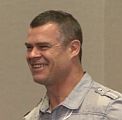LIVING WATER SMART IN BRITISH COLUMBIA:“While I was studying English literature, I was also auditing classes in quantum physics. When I develop a theory, it has to have a grounding. I have to have evidence,” stated Dr. Serpil Oppermann, co-editor of The Bloomsbury Handbook to the Blue Humanities

“My evidence comes from following recent scientific developments in oceanography, limnology, marine biology, hydrology, and of course quantum physics. I am an eco-critic and environmental humanities scholar. We work at the intersections of the sciences and the humanities. The Blue Humanities is now flourishing. And the book that I am now co-editing is going to make a change. It will be THE BOOK of the field. There are hundreds of books coming out. But this is the only one with the title BLUE HUMANITIES defining the field. And it is very inclusive,” stated Serpil Oppermann.
HOW BLUE ECOLOGY AND HARRY POTTER ARE CONNECTED: “We invited Michael Blackstock to contribute a chapter on Blue Ecology because we think Michael is well-positioned to help us achieve an ambitious goal,” stated Dr. Serpil Oppermann, co-editor of The Bloomsbury Handbook to the Blue Humanities

How are Harry Potter and Blue Ecology connected? The answer is Bloomsbury Publishing, the originating publisher and custodian of the Harry Potter series. “The Bloomsbury Handbook to the Blue Humanities has 35 chapters. My section has 10 chapters, and Blue Ecology is one of them. I knew that there is this Canadian scholar who developed Blue Ecology and he is very effective in Canada. So, I said to my team, if anyone is going to write the chapter on blue ecology it is going to be Michael Blackstock. He coined the term. It belongs to him,” stated Serpil Opperman.
LIVING WATER SMART IN BRITISH COLUMBIA: “Blue Ecology reinforces the attitude change that is necessary to support widespread use of tools and resources that help local governments design with nature,” stated Richard Boase, career environmental champion within local government

“Think of Blue Ecology as a compass in terms of how it relates to a water-first approach to Water Reconciliation between cultures. The compass points the way forward and to success. Because of the diversity in backgrounds, skills and experiences that we have in the Partnership for Water Sustainability in British Columbia, we are positioned to take what Michael Blackstock has created with the Blue Ecology framework and make it actionable in the local government sector,” stated Richard Boase.
LIVING WATER SMART IN BRITISH COLUMBIA: “The more you can build buzz around your work and get people energized, the more feasible it becomes. Success breeds success,” stated Dr. Jane Wei-Skillern of the University of California at Berkeley

“I was teaching an MBA elective on social entrepreneurship, was doing some case writing, and came across Guide Dogs for the Blind Association. Geraldine Peacock, the CEO, did all of these counter-intuitive things in order to get her organization’s impact bigger. But it was by decreasing their own organizational footprint, investing in their peers and former competitors, and focusing more narrowly on their core business, that enabled them to leverage their resources more broadly and create greater and more sustainable impact in the entire field,” stated Jane Wei-Skillern.
LIVING WATER SMART IN BRITISH COLUMBIA: “How you adapt to change is that you develop a culture where you welcome, and you try and anticipate, what a future state might be like. And then be nimble enough to adapt and adjust yourself to it,” stated Ramin Seifi, former General Manager of engineering and planning with Langley Township in the Metro Vancouver region

“In my conversations with current and former senior level municipal staff around the Metro Vancouver region, there is a sense among them that the current generation of politicians appears more interested in appeasing a few people who are outspoken, as opposed to listening to the advice of their professional staff. More than ever, we need STRONGER CHAMPIONS and people who believe in what they are doing at heart. When I reflect on my time with Langley Township, I hope my lasting contribution is the confidence that I instilled in people to not be afraid of trying something and being a champion for it,” stated Ramin Seifi.
LIVING WATER SMART IN BRITISH COLUMBIA: “When we keep it simple, practical and implementable, we achieve a lot more than when we make things complex. Make this your north star. It will get you over the finish line to deliver a strategy, plan or program,” stated Melony Burton, Manager of Infrastructure Planning with the City of Port Coquitlam in Metro Vancouver

“The purpose of the Metro Vancouver region’s Adaptive Management Framework is to measure watershed health. How well are your watershed plans working? We kept it simple, practical and implementable for a reason,” stated Melony Burton. “You are not going to measure everything every five years because it is unaffordable when you have multiple watersheds or limited resources. If you were to go back every five years and check, could you see your watershed health improving? How many of your recommendations have you implemented? ARE THEY WORKING?”
HUMANS ARE DEPLETING GROUNDWATER WORLD-WIDE: “Our team of data scientists, water specialists and policy experts compiled the first global-scale dataset of millions of groundwater level measurements,” stated Dr. Debra Perrone of the University of California, Santa Barbara

“Our study has two main findings. First, we show that rapid groundwater depletion is widespread around the world and that rates of decline have accelerated in recent decades, with levels falling by 20 inches or more yearly in some locations. Second, however, our research also reveals many cases where deliberate actions halted groundwater depletion. These results show that societies are not inevitably doomed to drain their groundwater supplies, and that with timely interventions, this important resource can recover,” wrote Debra Perrone, one of three co-authors.
EAP, THE ECOLOGICAL ACCOUNTING PROCESS, IS AN EXPRESSION OF BLUE ECOLOGY: “Rivers and streams in BC are sending us a message… change our attitude towards them. It is hard to hear their message, from a boardroom or Zoom rooms,” stated Michael Blackstock, co-founder of the Blue Ecology Foundation Institute

“Blue Ecology is about interweaving two ways of knowing through a collaborative framework that would help facilitate how Indigenous, provincial and local governments work as leaders on a common problem, the climate crisis. Tools like EAP can be used to shape the future, as our new attitude deploys these existing tools in new ways. Has the moment come to reframe ‘ecosystem services’ as ‘gifts of nature’? If it does not get measured, it does not get managed. EAP helps us measure and assess the trade-offs; and helps us understand when it is time to just let the land heal,” stated Michael Blackstock.
LIVING WATER SMART IN BRITISH COLUMBIA: “Think of Blue Ecology as a compass in terms of how it relates to a water-first approach. We are on a journey. The compass points the way forward,” stated Tim Pringle, a founding director and Past-President of the Partnership for Water Sustainability

“Streams need a place to be. If we cannot get our heads around that, we are not going to keep our streams. EAP provides a value picture of a stream system as a land use. Because nature is a system, you cannot slice and dice it. EAP, the Ecological Accounting Process, recognizes this and is a financial tool to give streams the support they need to survive in the local government setting. How are Blue Ecology and EAP interconnected? My answer is that Blue Ecology emphasizes the social perspective for protecting watersheds and streams. EAP shows how to achieve that outcome with a financial tool,” stated Tim Pringle.
LIVING WATER SMART IN BRITISH COLUMBIA: “We proceeded on three parallel tracks and established relationships with a new generation of provincial decisionmakers and staff,” stated Ted van der Gulik, President of the Partnership for Water Sustainability (January 2024)

“The Partnership is the engine for a network in the local government setting. Our mission is intergenerational. This means we are striving to bridge the gap in understanding; and we are doing what we can to help governments overcome organizational amnesia. The clock is ticking, and we are working hard to shape this outcome: what the Partnership and associated network will look like after the Year 2025. In 2023, we exceeded our own expectations. We are ahead of schedule in moving forward with the strategy for network continuity,” stated Ted van der Gulik.

